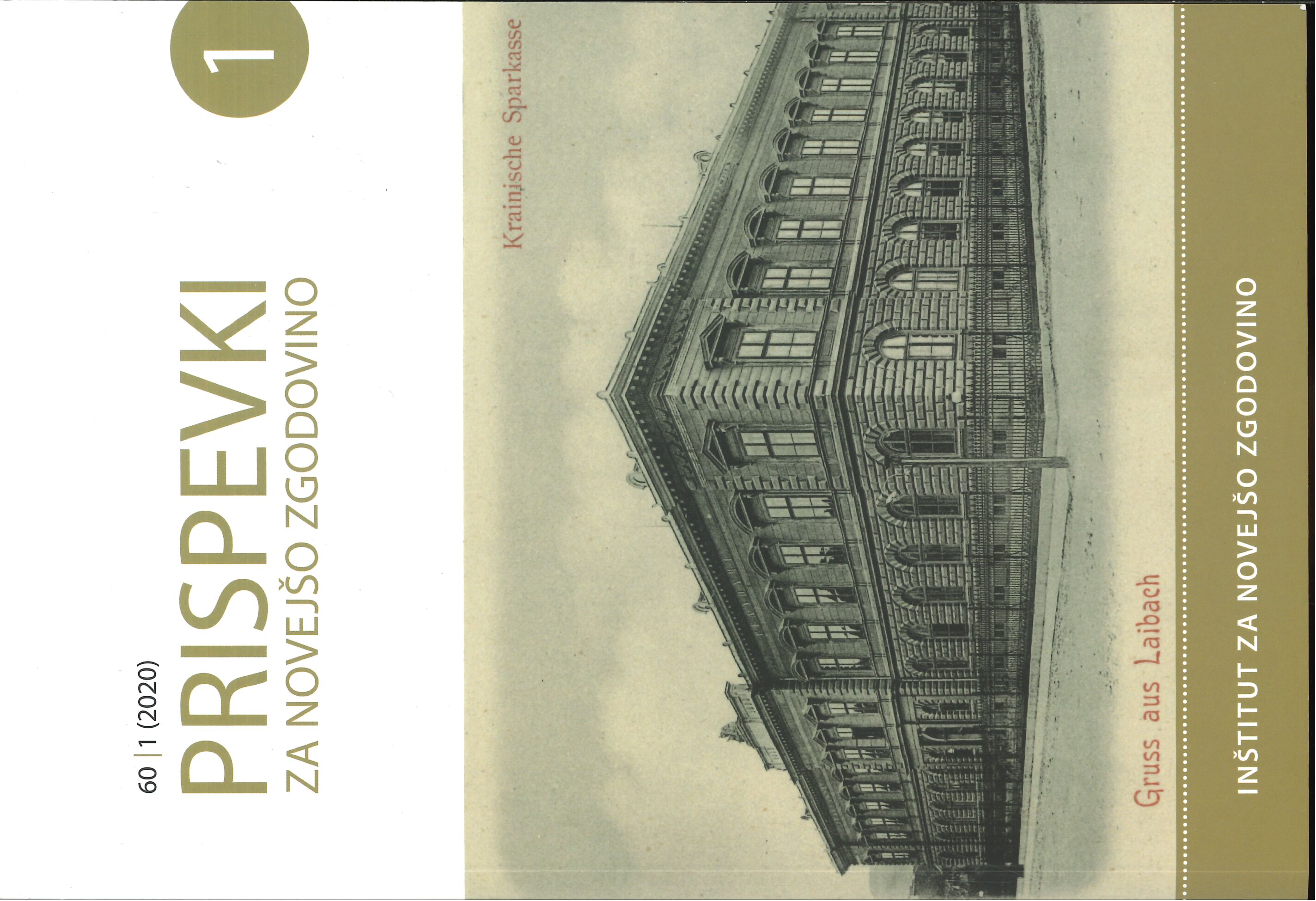»Kaj naj storim v slučaju, da naši častiti zadružniki ne bodo hoteli povišati deležev?«
Konflikti v Prvi žebljarski in železo – obrtni zadrugi v Kropi in Kamni Gorici v letih 1924 – 1927
DOI:
https://doi.org/10.51663/pnz.60.1.04Ključne besede:
zadružništvo, katolicizem, industrijski konflikti, Janez Evangelist Krek, Zadružna zveza v LjubljaniPovzetek
Članek se ukvarja s konflikti v Prvi žebljarski in železo – obrtni zadrugi v Kropi in Kamni Gorici v letih 1924 – 1927. Zadruga je bila sprva organizirana kot običajna delniška družba, vendar se je zaradi nezainteresiranosti lokalnih podjetnikov že pred prvo svetovno vojno približala načelom Krekovega – Raiffeisnovega zadružništva. Razvoj podjetja v delavsko produktivno zadrugo je dosegel vrh v letu 1922, ko so vsi člani za glasovanje na občnih zborih pridobili pravico enega glasu ne glede na število vplačanih deležev. Bolj demokratični princip delovanja zadruge se je v času dolžniških težav in boja s konkurenco za vodstvo izkazal kot ovira, iz česar so izšli številni konflikti. V tem pogledu je namen članka opozoriti na idejne in praktične probleme socialnega katolicizma, zlasti njegovega poskusa preseganja kapitalizma.
Literatura
Borak, Neven et al. Slovenska novejša zgodovina. Od programa Zedinjena Slovenija do mednarodnega priznanja Republike Slovenije, 1848–1992, 1. knjiga. Ljubljana: Inštitut za novejšo zgodovino in Mladinska knjiga, 2005.
Florjančič, Saša, ur. 20. stoletje. Življenje v Kropi in Kamni Gorici, 1. del. Kropa: Vigenjc, Glasilo Kovaškega muzeja v Kropi, 2005.
Florjančič, Saša. »Demografski razvoj Krope in Kamne Gorice do druge svetovne vojne.« V: 20. stoletje. Življenje v Kropi in Kamni Gorici, 1. del, ur. Saša Florjančič, 7–20. Kropa: Vigenjc, Glasilo Kovaškega muzeja v Kropi, 2005.
Gašperšič, Jože. »Iz vigenjca in fužine v tovarno. Ustanovitev Žebljarske zadruge v Kropi leta 1894 in njen razvoj do stavke 1. V. 1904.« Kronika, 3 (1963): 148–66.
Gortnar, Anica. »Zaton železarstva v Železnikih in Kropi ob koncu 19. stoletja.« Diplomsko delo, Univerza v Ljubljani, 2013.
Kronika Plamena kovinarske zadruge z o. j. v Kropi do leta 1940. Kropa: Plamen, 1944.
Lazarević, Žarko. Kmečki dolgovi na Slovenskem. Socialno – ekonomski vidiki zadolženosti slovenskih kmetov 1848–1948. Ljubljana: Znanstveno in publicistično središče, 1994.
Lazarević, Žarko in Jože Prinčič. Zgodovina slovenskega bančništva. Ljubljana: Združenje bank Slovenije, 2000.
Lazarević, Žarko. »Ekonomska samozaščita in odgovornost. Zadružništvo kot orodje obvladovanja osebnih tveganj.« V: Pomisli na jutri. O zgodovini (samo)odgovornosti, ur. Andrej Studen, 99–122. Ljubljana: Inštitut za novejšo zgodovino, 2012.
Mohorič, Ivan. Dva tisoč let železarstva na Gorenjskem, 1. knjiga. Ljubljana: Mladinska knjiga, 1969.
Prinčič, Jože. Tovarna vijakov Plamen Kropa: od konca druge svetovne vojne do stečaja in novega začetka, 1945–1997. Kropa: Kovaški muzej Kropa in Inštitut za novejšo zgodovino, 2007.
Sovran, J. [Krek, Janez Evangelist]. Črne bukve kmečkega stanu. Jedro kmečkega vprašanja. Ljubljana: Katoliška tiskarna, 1895.
Šmitek, Janez. »Sto let Plamena, 1894–1994.« V: Kroparski zbornik. Ob 100– letnici Plamena, 1894–1994, ur. Verena Štekar – Vidic, 89–105. Kropa in Radovljica: Muzeji radovljiške občine, 1995.
Šmitek, Zmago. »Družbena kultura Krope v prvi polovici 20. stoletja.« V: 20. stoletje. Življenje v Kropi in Kamni Gorici, 1. del, ur. Saša Florjančič, 21– 31. Kropa: Vigenjc, Glasilo Kovaškega muzeja v Kropi, 2005.
Objavljeno
Številka
Rubrika
Licenca
Avtorji prispevkov, objavljenih v tej reviji, soglašajo z naslednjimi pogoji glede avtorskih pravic:
- Avtorji ohranijo avtorske pravice, reviji pa odobrijo pravico do prve objave. Delo se hkrati zaščiti z licenco za prosto uporabo avtorskih del (Creative Commons Attribution License), ki drugim osebam omogoča deljenje dela ob priznanju avtorstva in prve objave v tej reviji.
- Avtorji lahko sklenejo ločene dodatne pogodbene dogovore za neizključno distribucijo različice dela, objavljene v reviji, (npr. oddaja v institucionalni repozitorij ali objava v knjigi) z navedbo, da je bilo delo prvič objavljeno v tej reviji.
- Pred postopkom pošiljanja in med njim lahko avtorji delo objavijo v spletu (npr. v institucionalnih repozitorijih ali na svoji spletnih strani), k čemer jih tudi spodbujamo, saj lahko to prispeva k plodnim izmenjavam ter hitrejšemu in obsežnejšemu navajanju objavljenega dela (glej The Effect of Open Access).


